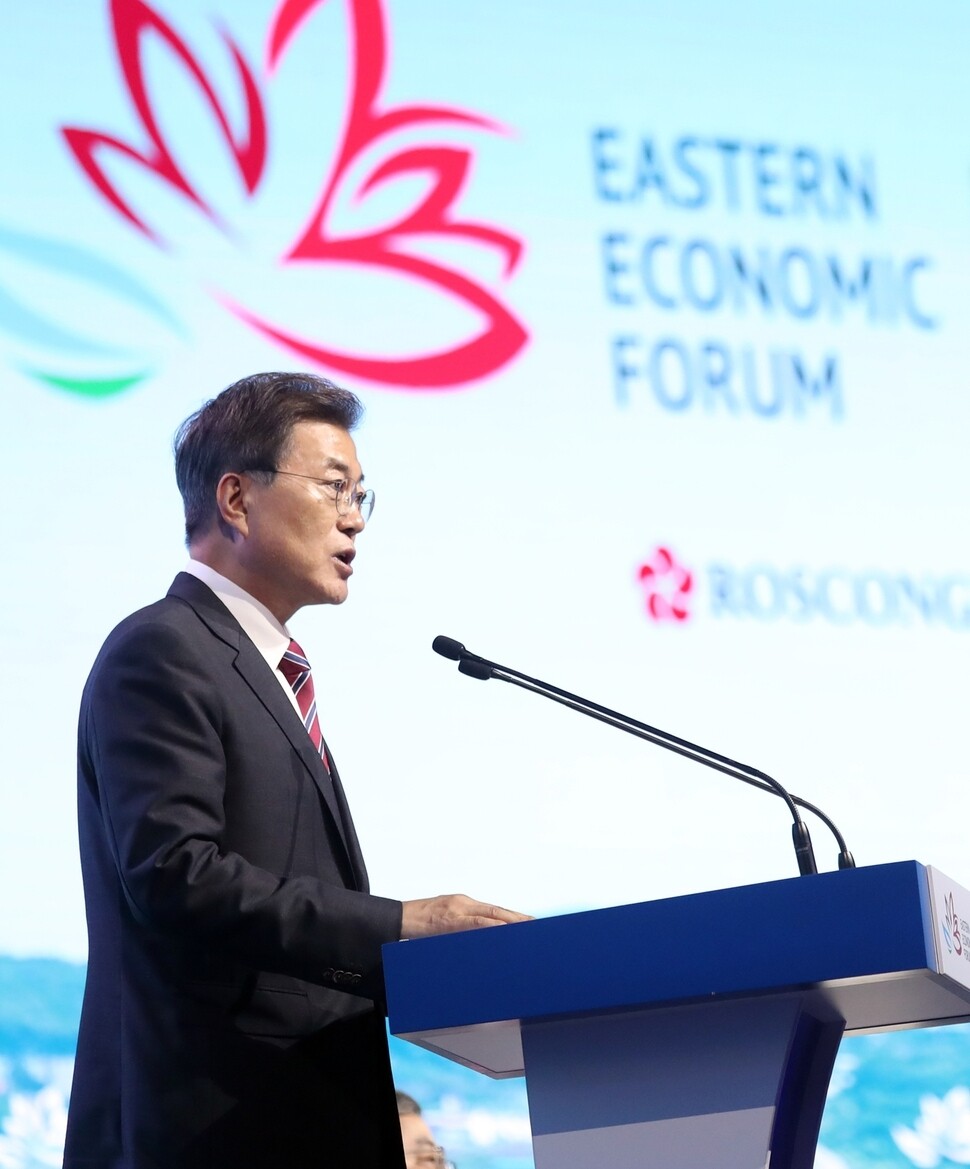hankyoreh
Links to other country sites 다른 나라 사이트 링크
South Koreans have positive view of President Moon’s new Northern and new Southern polices

The Presidential Committee on Northern Economic Cooperation (PCNEC) released findings on Dec. 6 from a survey on South Korean attitudes on Northern economic cooperation.
The results showed a large number of South Koreans holding positive attitudes on President Moon Jae-in’s “new Northern” and “new Southern” policies. Headed by chairperson Song Young-gil, the PCNEC is a presidential organization created at Moon’s instruction in August to handle economic cooperation with Russia and other northern countries.
The two-day survey by the polling organization Hankook Research was carried out at the PCNEC’s request on Nov. 30 and Dec. 1, with 1,000 adult men and women nationwide questioned (±3.1% margin of error with a 95% confidence level). A total of 78.3% of respondents agreed that the “new Southern” policies strengthening cooperation with Southeast Asian countries would help revitalize the South Korean economy.
The new Northern policies, which involve stronger cooperation with Russia and other Eurasian countries, were viewed positively by 67.6% of respondents. In the case of economic cooperation with Indonesia, Vietnam, and other Southeast Asian countries, 36.5%of respondents said the policies would be “very helpful” to the South Korean economy, while 41.8% said they would be “somewhat helpful.” Only 6.1% predicted they would be “not very helpful.” Respondents also showed support for economic cooperation with Russia, Mongolia, and Central Asian countries, with 26.6% saying the policies would be “very helpful” and 41.1% saying they would be “somewhat helpful.”
Anticipated economic effects of northern economic cooperation included “economic structure diversification” (64.9%) and “increased private-sector exchange” (63.4%). When asked to name what should be the chief focus of northern economic cooperation, 37.3% said energy, while 24.7% answered transportation and distribution. In contrast, relatively few respondents said the focus should be on manufacturing and other industry (14.9%) or farming and fishing products (5.3%).
The new Northern Policy focuses on promoting economic cooperation with Eurasia – including Russia’s far east, the three northeastern Chinese provinces, Mongolia, and the countries of Central Asia.
The plan echoes Moon’s ideas for a “new economic road map for the Korean Peninsula,” as stated in his speech in Berlin last July. The new Southern Policy was developed with eye toward broadening the scope of economic diplomacy from its focus on the US and China to include the 10 member countries of ASEAN, including Indonesia, Malaysia, Singapore, the Philippines, and Vietnam.
Survey respondents were less favorable on the results of the northern economic cooperation policies pursued since the 1990s. A total of 34.8% of respondents said the policies had “not yielded economic results,” while fully 40.7% said they did not know. Another 22.9% said there had been “minor economic results,” and 1.6% said the results were “considerable.” As reasons for the lack of success with previous policies, respondents cited “lack of mutual understanding and minimal human and cultural exchange” (44.6%) and “lack of systematic policy efforts” (42.7%).
By Noh Ji-won, staff reporter
Please direct questions or comments to [english@hani.co.kr]

Editorial・opinion
![[Guest essay] The real reason Korea’s new right wants to dub Rhee a founding father [Guest essay] The real reason Korea’s new right wants to dub Rhee a founding father](https://flexible.img.hani.co.kr/flexible/normal/500/300/imgdb/original/2024/0423/8317138574257878.jpg) [Guest essay] The real reason Korea’s new right wants to dub Rhee a founding father
[Guest essay] The real reason Korea’s new right wants to dub Rhee a founding father![[Column] ‘Choson’: Is it time we start referring to N. Korea in its own terms? [Column] ‘Choson’: Is it time we start referring to N. Korea in its own terms?](https://flexible.img.hani.co.kr/flexible/normal/500/300/imgdb/original/2024/0423/3617138579390322.jpg) [Column] ‘Choson’: Is it time we start referring to N. Korea in its own terms?
[Column] ‘Choson’: Is it time we start referring to N. Korea in its own terms?- [Editorial] Japan’s rewriting of history with Korea has gone too far
- [Column] The president’s questionable capacity for dialogue
- [Column] Are chaebol firms just pizza pies for families to divvy up as they please?
- [Column] Has Korea, too, crossed the Rubicon on China?
- [Correspondent’s column] In Japan’s alliance with US, echoes of its past alliances with UK
- [Editorial] Does Yoon think the Korean public is wrong?
- [Editorial] As it bolsters its alliance with US, Japan must be accountable for past
- [Guest essay] Amending the Constitution is Yoon’s key to leaving office in public’s good graces
Most viewed articles
- 1[Column] ‘Choson’: Is it time we start referring to N. Korea in its own terms?
- 2Why Korea shouldn’t welcome Japan’s newly beefed up defense cooperation with US
- 3[Guest essay] The real reason Korea’s new right wants to dub Rhee a founding father
- 4Opposition calls Yoon’s chief of staff appointment a ‘slap in the face’
- 5Senior doctors cut hours, prepare to resign as government refuses to scrap medical reform plan
- 6Terry Anderson, AP reporter who informed world of massacre in Gwangju, dies at 76
- 7[Column] The clock is ticking for Korea’s first lady
- 8[Editorial] Japan’s rewriting of history with Korea has gone too far
- 9New AI-based translation tools make their way into everyday life in Korea
- 10Survey: S. Koreans spend more time using smartphones than eating